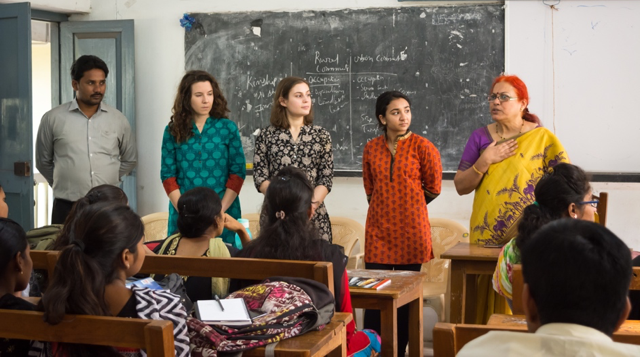Two Milken Institute School of Public Health students and one alumna traveled within India this past December to learn more about a local nongovernmental organization’s efforts to address and prevent gender-based violence (GBV).
The Milken Institute SPH group, led by Prevention and Community Health Associate Professor Amita Vyas, worked with Vasavya Mahila Mandali (VMM) to pilot prevention workshops at colleges and universities around the country. Specifically, Kayla Thompson, MPH ’19, Stephanie Asher, MPH ’19, and Gayatri Malhotra, MPH ’18, evaluated the effectiveness of the two-day workshops to help improve future trainings.
"For many of these students, this is the first time they have been exposed to gender-based violence education,” Asher says. “We surveyed them before the training workshop to get a cross-sectional understanding of their perspectives on gender norms and gender-based violence. After the workshop, we spent time talking in depth to the students and trainers about their lived and learned experiences, as well as what they had learned during the workshop."
Approximately 30 percent of women in India have experienced physical or sexual violence since the age of 15, according to a USAID report, but little work has been done to look at GBV specifically amongst college and university students in India. For this reason, the VMM-hosted GBV workshops were held at colleges and universities in Bhubaneswar, Odisha and Visakhapatnam, Andhra Pradesh to better understand and address the problem of GBV among this age group. The workshops were conducted by local professionals trained by Girl Rising, an organization that campaigns for girls’ education and empowerment and seeks to change the way that the world values girls.
The first day of workshops focused on naming the violence and providing clear definitions on GBV and various forms of violence. Students had the opportunity to share their perspectives on social norms around gender roles, as well as the consequences of not conforming to those roles. Students were surprised to see that both genders have experienced pressures to subscribe to these norms.
The second day was focused on using the power of storytelling as a platform to create change. Videos from the feature film Girl Rising were screened to help students feel empowered to share their personal stories of violence in front of their peers. Many expressed that this was the first time they could talk freely about their encounters with violence. Students were comforted to hear that others had similar experiences and that they are not alone. Oftentimes, after one student shared her or his story, peers then gained the confidence to share their own stories. This created a safe space where students could empathize with one another. By the end of day two, students were motivated and equipped with the tools to make strides towards preventing GBV within their local communities and, more specifically, on their college and university campuses.
As students discovered their own experiences of GBV, they also learned that GBV is a global issue. For example, many of the students in India were shocked to learn GBV is prevalent across the U.S. Through this cross-cultural interaction between India and the U.S., norms were challenged as students attending the GBV workshops recognized that the fight to prevent GBV is a global one. Through these GBV workshops, the hope is to spark in the next generation of India’s youth to stand up, speak up, and stop the violence.
“From here, we plan to take this information and continue collaborating with Girl Rising and VMM to improve upon these workshops with evidence-based research,” Thompson says. “Long term, it would be nice to see workshops such as these implemented across the world, but for now, we will continue to focus our efforts in India.”


